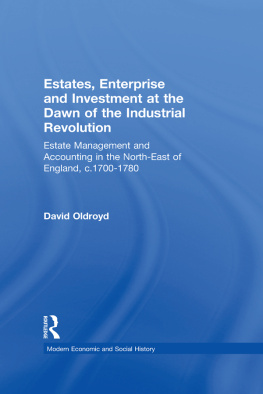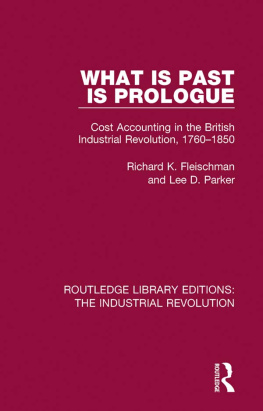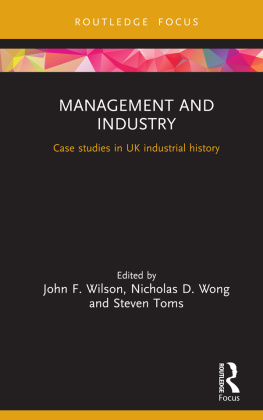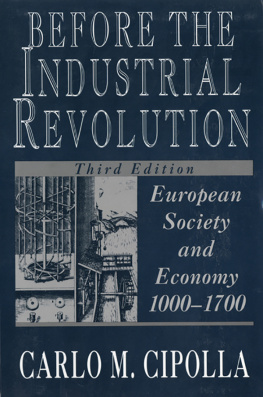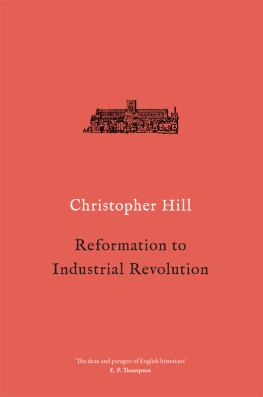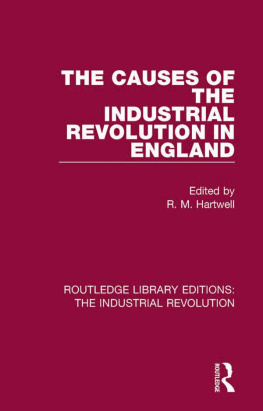Estates, Enterprise and Investment at the Dawn of the Industrial Revolution
Modern Economic and Social History Series
General Editor: Derek H. Aldcroft
Titles in the series include:
The Hidden Cost of Economic Development
The Biological Standard of Living in Antebellum Pennsylvania
Timothy Cuff
Industrial Reorganization and Government Policy in Interwar Britain
Julian Greaves
Europes Third World
The European Periphery in the Interwar Years
Derek H. Aldcroft
The Popularization of Malthus in Early Nineteenth-Century England
Martineau, Cobbett and the Pauper Press
James P. Huzel
Taste, Trade and Technology
The Development of the International Meat Industry since 1840
Richard Perren
Alfred Herbert Ltd and the British Machine Tool Industry, 18871983
Roger Lloyd-Jones and M.J. Lewis
Rethinking Nineteenth-Century Liberalism
Richard Cobden Bicentenary Essays
Edited by Anthony Howe and Simon Morgan
Governance, Growth and Global Leadership
The Role of the State in Technological Progress, 17502000
Espen Moe
Triumph of the South
A Regional Economic History of Early Twentieth Century Britain
Peter Scott
Estates, Enterprise and Investment at the Dawn of the Industrial Revolution
Estate Management and Accounting in the North-East of England, c. 17001780
DAVID OLDROYD
University of Newcastle, UK
First published 2007 by Ashgate Publishing
Published 2016 by Routledge
2 Park Square, Milton Park, Abingdon, Oxon OX14 4RN
711 Third Avenue, New York, NY 10017, USA
Routledge is an imprint of the Taylor & Francis Group, an informa business
Copyright 2007 David Oldroyd
David Oldroyd has assened his moral right under the Copyright. Designs and Patents Act, 1988, to be identified as the author of this work.
All rights reserved. No part of this book may be reprinted or reproduced or utilised in any form or by any electronic, mechanical, or other means, now known or hereafter invented, including photocopying and recording, or in any information storage or retrieval system, without permission in writing from the publishers.
Notice:
Product or corporate names may be trademarks or registered trademarks, and are used only for identification and explanation without intent to infringe.
British Library Cataloguing in Publication Data
Oldroyd, David
Estates, enterprise and investment at the dawn of the Industrial Revolution : estate management and accounting in the north-east of England, c. 17001780. (Modern economic and social history)
1.Administration of estates England, North East History 18th century
I.Title
333.3'09428'09033
Library of Congress Cataloging-in-Publication Data
Oldroyd, David
Estates, enterprise and investment at the dawn of the Industrial Revolution : estate management and accounting in the north-east of England, c. 17001780 / David Oldroyd.
p. cm. (Modern economic and social history)
Includes bibliographical references and index.
ISBN-13: 978-0-7546-3455-3 (alk. paper)
ISBN-10: 0-7546-3455-8 (alk. paper)
1. Administration of estates England, North East History 18th century. 2.
IndustriesEngland, North EastHistory-18th century. 3. Saving and investment
England, North EastHistory-18th century. 4. England, North EastEconomic
conditions. I. Title. II. Series.
HC254.5.O43 2007
333.309428'09033dc22
2006017122
ISBN 9780754634553 (hbk)
ISBN 9781138264298 (pbk)
Economic and social history has been a flourishing subject of scholarly study during recent decades. Not only has the volume of literature increased enormously but the range of interest in time, space and subject matter has broadened considerably so that today there are many sub-branches of the subject which have developed considerable status in their own right.
One of the aims of this series is to encourage the publication of scholarly monographs on any aspect of modern economic and social history. The geographical coverage is world-wide and contributions on the non-British themes will be especially welcome. While emphasis will be placed on works embodying original research, it is also intended that the series should provide the opportunity to publish studies of a more general thematic nature which offer a reappraisal or critical analysis of major issues of debate.
Derek H. Aldcroft
University of Leicester
The author gratefully acknowledges the help of the staff of the Durham, Northumberland and Tyne and Wear record offices.
CHAPTER 1
Introduction
Pollard (1965, pp. 25, 2930) stated two principal reasons why the English landed estate influenced the development of management during the Industrial Revolution; and the same could be said about why estate accounting is regarded as important to the development of modern accounting practice: (1) The estate represented the largest and most clearly defmed type of business organization in existence at the dawn of industrialization. Estate management had a long history. Oschinsky (1956), for example, noted the existence of four medieval treatises on estate management and about 20 on estate accounting. (2) Formative industrial development took place on estates, abetted by English law, which gave landowners ownership of the minerals under their land (Habakkuk, 1953). The combination of these two factors encouraged the dissemination of estate management practice to other sectors during the Industrial Revolution. Napier (1997) argued this was the case for nineteenth century canal and railway companies, and the same was true of coal. According to Brenner (1985a, p. 53), the origins of the Industrial Revolution lay in agriculture. Writing from a Marxist perspective, he maintained that the key to English industrial development was to be found in the capitalist structure of agriculture. For Bryer (2000a; 2000b; 2006), the modern capitalist mentality arose when wage labour on estates was exposed to capital from trade flowing back into land from the mid-seventeenth century. According to him, capitalist landlords and their stewards were instrumental in spreading the capitalist mentality throughout agriculture and industry. There is general agreement, therefore, across a variety of perspectives about the key role of estates in British economic development during the eighteenth and nineteenth centuries.
The aim of the study is to examine management practice on estates in the Northeast of England c. 1700 to 1780 through the lens of the accounts and supporting documentation. Accounts encompassed every aspect of estate operations from the housekeepers groceries to the lead and coalmines, and thus provide direct evidence of the underlying management systems over a diverse range of activities. The information flows on estates provide an excellent medium for testing hypotheses concerning the management of estates and the attitudes of their owners and stewards. For instance, Bryer (2000a; 2000b; 2005a; 2006) argued that Marxs theory of transition from feudalism to capitalism is capable of testing through the accounts, as these should reveal the underlying mentality of the proprietor. He maintained that the true capitalist will be governed by the rate of return on investment, and one would therefore expect to find evidence of this concern reflected in the accounts, whereas the feudal mentality would tend to focus on the consumable surplus of cash and commodities. A word of caution is needed, however. First, accounts in themselves may be insufficient for imputing the reasons why they were prepared and the uses to which they were put (Hoskin and Macve, 2000). Accounting historians have been criticized for reading too much of present-day practice into their interpretation of past records (Miller and Napier, 1993). Corroboration is needed in the form of minutes, correspondence etc. Second, although one would expect the content of accounts to reflect the attitude of the proprietor, it does not necessarily follow. Accounts can only provide direct confirmation of attitudes present. One cannot assume from the accounts alone that a particular attitude was lacking. As we shall see, there are many who still believe that accounting was of limited use to industrialists during the Industrial Revolution for investment decisions, without denying that those same industrialists acted entrepreneurially. They did so without the benefit of relevant accounting data, or so the argument goes. Despite the difficulties, accounts supported by correspondence remain an excellent source of evidence relating to estate-practice during the Industrial Revolution, and one which has been under-utilized to date. The accounting records are also significant in what they reveal about the role and status of accounting within the organization as well as the technical state of accounting knowledge. The study employs various technical accounting and industrial terms throughout, which are explained in the Glossary. Extracts from accounts are included in the figures, not just to illustrate a point, but also to assist other researchers, particularly those from a non-accounting background, in deciphering the meaning of similar documents they encounter.

